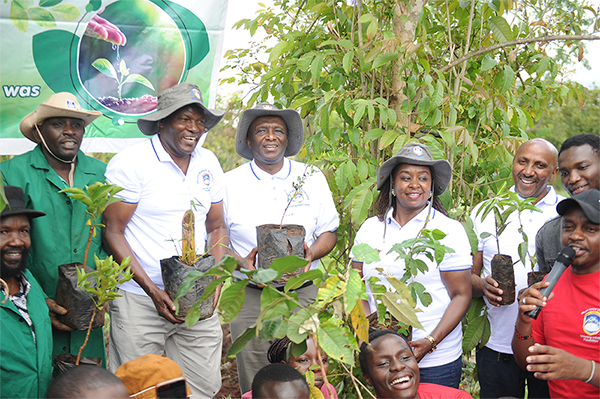
MKU marks The National Tree Growing Day
Preliminaries
I take this opportunity to acknowledge the Chairman of the Board of Directors, Mount Kenya University, Prof Simon Gicharu.
Ladies and Gentlemen, I am delighted to be here this morning, joining the nation to support the national vision of growing 15 billion trees between 2022 and 2032.
Cultivation of Medicinal Trees
I stand before you today to share a topic of great significance and relevance to our environment and well-being – the cultivation of medicinal trees at Mount Kenya University. Our commitment to sustainable practices and the holistic well-being of our community has led us to embark on a journey to harness the healing power of nature.

Mount Kenya University has always been a pioneer in promoting environmental consciousness, and the initiative to grow medicinal trees aligns seamlessly with our ethos. Medicinal trees are not only a source of natural remedies but also play a pivotal role in maintaining the ecological balance of our surroundings.
The biodiversity of Mount Kenya provides a unique opportunity for us to cultivate a variety of medicinal trees, each with its own set of healing properties. Imagine a botanic garden adorned with the likes of Neem, Aloe Vera, Warbugia, Moringa, Eucalyptus, and many other medicinal trees whose leaves, bark, and extracts have been revered for their therapeutic benefits for centuries.
The advantages of such an initiative are manifold. First and foremost, it enhances the availability of natural remedies for common ailments right on our doorstep. The healing power of these trees can contribute significantly to the well-being of our community, offering alternatives to conventional medicine while promoting a healthier lifestyle.

Moreover, the cultivation of medicinal trees aligns with global efforts to preserve biodiversity and combat climate change. Trees are nature’s air purifiers, and by growing medicinal varieties, we not only contribute to a healthier environment but also create a living pharmacy that future generations can benefit from.
This initiative also provides a unique learning opportunity for our students. Imagine the wealth of knowledge they can gain by actively participating in the cultivation, care, and extraction processes of these medicinal trees. It’s a hands-on approach to education that goes beyond the classroom, fostering a deep connection with nature and instilling values of sustainability.
In conclusion, the cultivation of medicinal trees at Mount Kenya University is not just a practical step towards a healthier community but a symbolic gesture of our commitment to the well-being of our planet. Let us embark on this journey together, nurturing the roots of health and knowledge that will undoubtedly bear fruits for generations to come.
Conclusion
Distinguished Guests, Ladies and Gentlemen, as I conclude, I remind everyone of the collective responsibility to protect our environment while securing the future generations. The value of trees is underestimated but together we can make that difference today.
Prof, Deogratius Jaganyi,
Vice-Chancellor












